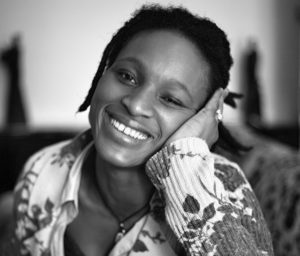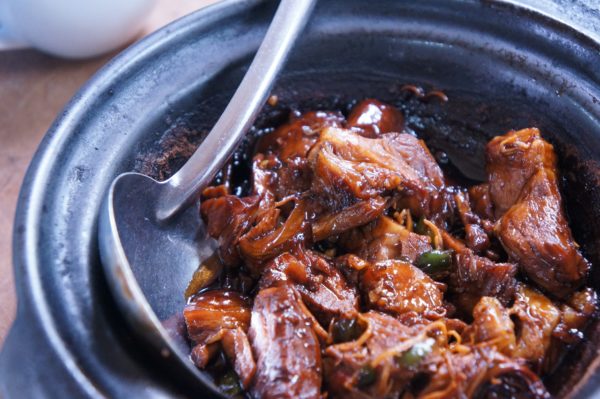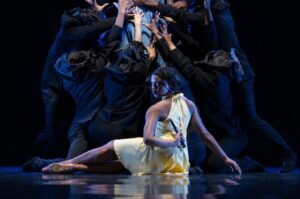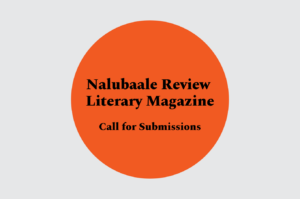Nigerian novelist Chika Unigwe stirred up social media last week with a Facebook post that had everyone putting on their thinking caps and asking serious questions about how we tell our stories.
The Facebook post is a thought-provoking reflection on the power in names. Unigwe uses the distinction between the standard English term for wild-caught meat “game” and the Nigerian term “bushmeat” to expose the dark underbelly of linguistic practices that we tend to take for granted. The short but hard-hitting statement is a call to African writers to be vigilant about how language can paradoxically be used to suppress their voices.
Book critic and social media influencer Ikhide Ikheloa has since described the piece as “a powerful and evocative intervention on the issue of narrative and perhaps, cultural appropriation.” We couldn’t agree more. Take a peek at the post [pasted below] and let us know what you think.
*
Years ago, I was enjoying my bushmeat in an Australian restaurant in Belgium and said as much when my dinner companion gently reminded me that what I was eating was “game” and not bushmeat, and I had been invited out to “enjoy game.” Apparently, bushmeat is what you get in a small, ramshackle affair by the roadside in Nsukka, paired with palm wine and most often eaten by hand, not meat carefully paired with a Pinot Noir or a Shiraz in a restaurant where the silverware is so shiny and so smudge free you can use it to fix your makeup.
This morning, I did a quick google search and found this:
“The term ‘bushmeat’ refers to meat that comes from wild animals captured in developing regions of the world such as Africa. Bushmeat comes from a variety of wild animals, including bats, nonhuman primates (e.g., monkeys), cane rats (grasscutters), and duiker (antelope).”
“Game are wild animals and birds. Large native game animals living in America include antelope, buffalo, bear, deer, elk, moose, reindeer, and wild boar.“
Fact 1: bushmeat and game come from wild animals.
Fact 2: Antelope is bushmeat when in Africa but game once it crosses the ocean.
Question: Who does the naming? Why does it matter? What does naming say about the imperialism/hierarchy of cultures?
Naming is neither innocent nor neutral. Victors name the conquered, the wealthy name the poor. Think about why every westerner in Africa is an “expatriate” and Africans in the west are “immigrants,” and how the labelling influences the dominant narratives around these two groups. Think about why you are a cosmopolitan if you’ve travelled extensively (in the west) and speak a variety of European languages but not if you are Nigerian and have lived/travelled extensively across Africa and speak many African languages.
One of the stories my father-in-law (who taught history and French for many years) and my husband (who is a history buff) love to tell the younger generation (children and grandchildren) is how William the Conqueror influenced the names of (cooked) meat in English. When William the Conqueror invaded England in 1066, he gave land to the knights who fought with him and made them dukes and earls and etc. They did not work the farms or cook their own food but they named the meat which landed on their plates. The transformation from cow to beef (le boeuf), from pig to pork (le porc), from calf to veal (le veau) happened once the animals left the farms of the poor Anglo Saxon farmers and landed all ready to be devoured by the nobility.
Cultural imperialism of course goes beyond naming. It is also about what is framed as “civilized” and therefore desirable and what is not. It is about people turning up their noses at people eating eba with their hands and yet killing themselves to learn how to use chopsticks so they can “eat Japanese food the proper way.” It’s about people gagging at the thought of me enjoying goat meat (good thing it didn’t make it to the plates of the nobility or we would have been calling it chevon like the French or some other variant of chèvre) and yet ridiculing me for thinking that raw oysters are gross. It is people thinking that when the French speak English with their accent (including H-dropping), it is sexy but when a Yoruba does it, it is “bush.” It is people rolling their eyes at African superstitions yet believing that the position of the stars on the day they were born has an effect on their personality (and determines their fate). It is about people thinking that there is one single measure of civilization and that they calibrate it.
Years ago, I was invited to talk about my favorite pieces of classical music on a radio show in Belgium. I was upfront in my correspondence with the (producer?) about classical music not being my cup of tea. I think I said I wasn’t knowledgeable at all about it. Undeterred, she sent me a box of CDs of classical music, determined to bring me on the right side of “civilization.” She very thoughtfully labelled each CD according to its “mood.” I gifted the CDs to my husband (who does enjoy classical music). A few weeks later, I get a mail from the producer asking if I’d played the CDs. I lied and said I had. She decided I was ready to come on the show. Cut a long story short, I went on the show and the woman begins by talking about my ignorance of classical music before the show and then asks, ‘So, you had no culture of music growing up in Nigeria?” In proper Naija fashion, I answered her question with a question. I asked her what she knew of highlife (“Highlife? What’s that?”). I asked her what she knew of juju (she’d never heard of it.) I told her it didn’t matter to my father that she knew Mozart and Beethoven, if she knew nothing of highlife and juju, she was a cultural barbarian. She was appalled. She had not thought that there was a “musical culture” outside of the European tradition. Like my mother would say, I gave her homework.
In recent years, I have begun making a conscious effort to pass out such homework where I can. It is our collective responsibility to challenge narratives that privilege other cultures/voices/stories over ours.
And that is why I no longer use the term, “game,” for any kind of bushmeat.
Chika.
*********
Facebook link image by yvonne lee harijanto on Unsplash
********
About the Author
 Chika Unigwe’s books include De Zwarte Messias, Night Dancer, On Black Sisters Street, Ije at School, and A Rainbow for Dinner. She has taught at Haverford College, University of Ghent, and for the Farafina Writing Workshop in Lagos, Nigeria.
Chika Unigwe’s books include De Zwarte Messias, Night Dancer, On Black Sisters Street, Ije at School, and A Rainbow for Dinner. She has taught at Haverford College, University of Ghent, and for the Farafina Writing Workshop in Lagos, Nigeria.










Jay September 21, 2023 02:11
I actually found this article because I was curious if deer were considered bushmeat after coming upon the term and never hearing it before. I found the read interesting. Admittedly I had never considered the use of words in such a manner before, although it does make sense to me. For me words are a tool with a purpose, to communicate. I don't view them as weapons although more often than not many people will use them in such a way, unfortunately. Regardless of how some folks may feel about terms such as "game" or "bushmeat" I see them as interchangeable, cultural slang. I'll probably start using the term bushmeat now as I don't like using the same words over and over again.